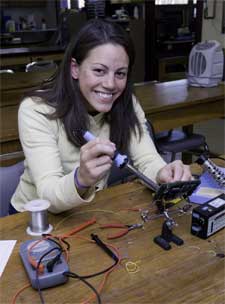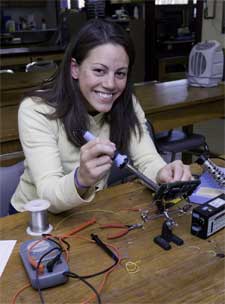 Watertown, Conn. resident to be honored as scholar-athlete of the week
Watertown, Conn. resident to be honored as scholar-athlete of the week
KINGSTON, R.I. – February 4, 2008 — When she visited a family friend at the hospital, Maria Cieslewski was amazed at the various technologies being used to provide aid to sick and disabled patients. It was a pivotal moment that convinced her to study biomedical engineering in college.
Now a senior at the University of Rhode Island, Cieslewski is making steady progress toward her career goal.
“Biomedical engineering is basically electrical engineering for medicine,” explained the Watertown, Conn. resident. “For instance, in an internship I built a Powerscan device that helps quadriplegics and paraplegics control their environment. Using their finger or their tongue they can change the channel on the TV, turn up the volume, and turn on and off the lights so they don’t have to call the nurse so often. The device can be adapted to the different abilities of individual patients as needed.”
When she’s not in the engineering labs, Cieslewski can be found in the swimming pool. “I’ve been swimming competitively since the seventh grade when my younger brother started swimming,” she said. “I couldn’t have him be better than me, so that motivated me to get into it, too.”
A freestyle sprinter, Cieslewski competed in the state and league championships while in high school, and she has consistently been a top performer on the URI swim team, earning the Most Improved Swimmer award last year.
“The team is truly incredible,” she said with an enthusiastic smile. “We work so hard together. It’s been the greatest bonding experience that I ever could have imagined. We are so close as teammates.”
Cieslewski and the URI team will compete in the Atlantic-10 Championships Feb. 20 to 23, and she will be honored at halftime of a URI men’s basketball game on March 8 as the URI scholar-athlete of the week, the only member of the women’s swim team to be so honored this year.
Finding time to swim 20 hours per week while also completing her rigorous schoolwork is quite a challenge.
“It’s definitely tough to pull it off, and sometimes I think I can’t do it, but every year I manage to make it through and continue on another year,” said Cieslewski, who also served as vice president of the URI student-athlete advisory committee. “It’s actually good for me because I like to stick to a tight schedule. It makes me focus. And my family has given me a great deal of support, so I owe a lot to them.”
While her competitive swimming career will likely be ending soon, that won’t mean that the URI student will be giving up on every form of competition. She took up cycling last summer with her eye toward entering her first triathlon later this year.
Cieslewski will earn two undergraduate degrees from URI next December – one each in biomedical engineering and electrical engineering – at which point she hopes to have a job designing biomedical devices.
“Eventually I want to use my engineering skills to adapt these devices to children with disabilities,” Cieslewski said. “New technologies are improving so quickly, so I hope to initiate a program at a hospital where I could design something specific to help children get better. It would be great to see my work improve the lives of kids right in front of me.”

